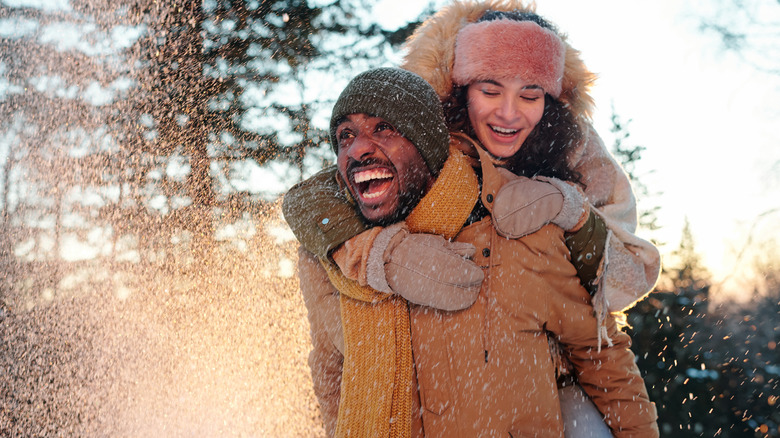How Cuffing Season Can Help You Gain Clarity About Your Relationship
Days are getting shorter and seasonal affective disorder rates are rising which can only mean one thing: we are deep in the heart of cuffing season. With the holiday season being one of the most stressful times of year for 88% of Americans per OnePoll, it's no surprise that people don't want to face cold months and family gatherings alone.
If you feel like the word appeared out of nowhere, you're not alone. Though the word has risen in popularity in recent years, there's still questions about what cuffing season is and whether it actually exists. Esquire traced the roots of the word to an Urban Dictionary post in 2011, but it wasn't until 2013 when "cuffing season" really entered the zeitgeist, making its way into memes — like this Instagram post about the cuffing season timeline — and songs, like Fabolous' "Cuffin Season."
Winter months are when people are more likely to be searching the internet for intimacy. A 2013 study published by the Archives of Sexual Behavior found that, over a five-year period, Google searches dating apps and websites consistently peaked in the winter and again at the beginning of summer. According to Vogue, dating apps like Hinge see a similar uptick in users looking for relationships during the winter months.
Cuffing season isn't just a thing for single people, either. A study published in the Journal of Social and Personal Relationships found the holiday season can be a proving ground for people already in serious relationships.
Holidays can make or break a relationship
Just because you're part of an established couple doesn't mean the holiday season is any less stressful than if you were single. Dr. Donna T. Novak, Psy.D., a licensed psychologist in Simi Valley, CA, told People that how connected and supported someone feels by their partner has a major impact on how they view the relationship once the holidays are over.
According to the same study by OnePoll mentioned above, couples have an average of seven arguments during this time of year — arguments that Marcia Naomi Berger, MSW, LCSW, writes on her blog are often sparked by poor communication or not knowing how to navigate chaotic schedules and extra responsibilities. Dr. Supriya Blair, Psy.D., a clinical psychologist in Albany, NY, says these disagreements give couples a chance to see other sides to who they're with (via People). How someone responds to conflict or disappointing, while not a deal breaker necessarily, may hint at bigger compatibility problems.
Ultimately, if you're feeling more alone instead of less around the holidays, Dr.Novak warns it may be time to look at your relationship.
If this is your first holiday with your partner, Dr. Blair suggests paying attention to what happens when you meet your partner's friends and family. Someone who is excited about their partner generally gushes, says Dr. Blair, so hearing things like "I've heard so much about you!" are signs they probably want the relationship to last past Valentine's Day.
Ways to safeguard your relationship from holiday stress
If you want your relationship to last through the holidays, learning how to talk to your partner has to be a top priority, Dr. Donna T. Novak, Psy.D, told People. This means being able to have productive conversations before conflict arises and being able to talk things out when it does.
Dr. Novak suggests talking with your partner about holiday expectations. The holiday season might look one way to you, but may mean something different to your partner, so talking about how you've celebrated in the past and how you'd like to now is vital. Kat Mindenhall, LCSW, a Denver-based therapist, writes for A Peaceful Life Counseling that discussing these traditions can help you find a middle ground, forging new holiday traditions in the process — ones that should help make cuffing season something you both look forward to.
Other expectations to consider are time and money. If you have joint expenses, plan a holiday budget together. For splitting time between events, come up with a plan of attack before the holiday season kicks off. Pro tip: a 2019 study found four hours was the average amount of time family gatherings were enjoyable.
Dr. Novak adds that it's a good idea to make come up with an escape plan, like coming up with a code word, for getting out of uncomfortable situations. The key to making it to the next holiday season is going into this one as a team.


